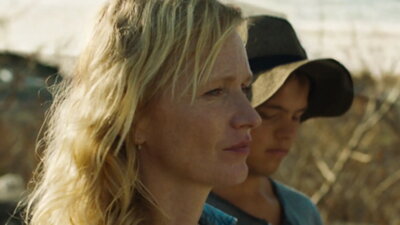“Don’t worry. It’s gonna be nice, David.”
 The feature film Caravan opens with an out-of-focus shot, first trained on the bright overhead sun, then panning to the glimmering sea below. Gentle ambient music accompanies the soft sound of waves splashing onto the shore. Still focused on this shot, viewers hear the above words—the opening dialogue of the film—spoken in a similarly gentle manner.
The feature film Caravan opens with an out-of-focus shot, first trained on the bright overhead sun, then panning to the glimmering sea below. Gentle ambient music accompanies the soft sound of waves splashing onto the shore. Still focused on this shot, viewers hear the above words—the opening dialogue of the film—spoken in a similarly gentle manner.
Viewers soon find out that the whispered speaker is Ester, the single mother of David, a nonverbal young man with unspecified developmental disabilities. Ester serves as the protagonist, and the film centers on her relationship with her son.
Caravan evades many of the reductive tropes common to disability representation in media, and specifically, representation of caretaker relationships. It avoids depicting their life together as simply inspiring due to David being disabled; portraying Ester as an unflinching, all-good, self-sacrificing mother or David as an inanimate object with without autonomy or actions of his own; or suggesting both of their lives are full of only hardship and struggle.
Instead, this film portrays a complex dynamic, full of both challenge and joy. Visceral physicality plays a central role in their relationship.
Kirchnerová drew upon her experience as a mother of a disabled child when creating this film. She spent six months looking for an actor to play David and ultimately found David Vodstrčil, who goes to the same school as her son. Kirchnerová hopes that Caravan will make people less afraid of portraying disability in their work.
“Disabled people are just like other people,” Kirchnerová said in an interview with Variety. “Zuza is such a great character, because she’s not prejudiced. She looks at David and sees a teenage boy, not a diagnosis. She would behave the same with everyone else.”
David has physical outbursts. Sometimes he’s able to calm down with only minimal collateral damage. But other times, the consequences are more significant. Early on in the film, Ester and David are staying with Petra, one of Ester’s friends. And early one morning Ester awakens to the aftermath of one of David’s meltdowns: Petra and her daughters sitting in their living room, which David had torn apart the night before. Plants, furniture, and a book gifted from their grandmother are all knocked on the ground. Broken glass dots the carpet, and a stray shard has to be picked out of one of the girl’s feet, all while Ester looks on and does her best to tidy up.
Damage done isn’t restricted to just objects. Later in the film, viewers witness David slamming his own head against a wall. And throughout the film, viewers see a smattering of scars across Ester’s skin, physical memories of meltdowns past.
Viewers also glimpse other people’s responses to David. During the living room scene, one of the daughters unambiguously tells her mother, “I don’t want him here,” with Ester right there. Later that evening, Petra shares similar sentiments to her husband, though this time, when she assumes Ester is out-of-earshot: “I had no idea he was this bad now. The last time I saw him, he was so little, so cute, he looked almost normal. I don’t think she even realizes it. She’s with him every day. I’m so sorry to see her live like this.”
It’s clear to see that these aren’t easy circumstances. Nonetheless, the film also depicts Ester and David’s life together with great joy and affection. Though viewers witnessed some of these moments early in the film, most of them come later, after the pair have been broken out of their standard dynamic by the addition of Zuza, a traveler who joins them on their journey.
Just as David’s sometimes intense physicality is shown to create challenges, touch and movement also take on a contrasting role in Caravan, indicative of gentleness and play. Shots of Ester caressing David’s face and vice versa—sometimes alternating between the two within the same scene—reinforce the tenderness and love between the pair. There are also multiple scenes where they are flailing about joyously, passionately dancing together under agricultural sprinklers at a farm, in a scrubby field, and at an end-of-summer festival.
The framing of the film also underlines the importance of movement and touch. Countless times, viewers are shown close-ups of hands. Primarily, these close-ups are of David’s hands—very fitting, since, without access to spoken language, his hands are his principal vehicle for communication. Just as they express his frustrations and anger, they also showcase his curiosity, tenderness, and joy. Even without dialogue of his own, it is through touch and movement that David exhibits his own autonomy and decisions. He is a fully realized character, every bit as central to the film as Ester.
Watching Caravan, I found myself being drawn in by the complexities. I’d feel uneasy when David had a physical outburst, or when Ester wrestled him down to the ground, elated as the pair danced around in unencumbered joy, uncomfortable and frustrated listening to Petra’s comments, and serene seeing the close-ups of hands, caressing faces, splayed up towards the sky.
With any life, there are joyous and challenging times. Caravan reflects both the lows and the highs, with nuance and care.
Caravan, directed by Zuzana Kirchnerová, recently premiered at the 2025 Cannes Film Festival as an Official Selection in the Un Certain Regard section. It will be theatrically released in the Czech Republic in August 2025.







